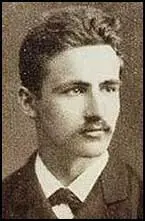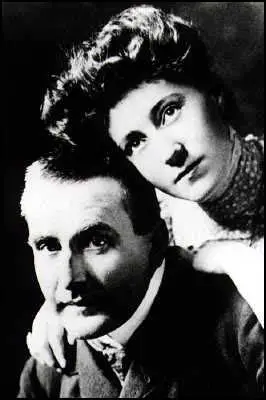Frank Wedekind

Benjamin Franklin Wedekind, the second of the six children born to Friedrich Wilhelm Wedekind, a physician, and Emilie Kammerer, a German singer and actress, was born in Hanover on 24th July, 1864. The family moved to Lenzburg in Switzerland, where his father had purchased a castle.
In 1884 Wedekind entered the University of Lausanne, and then moved to the University of Munich. He studied law and literature, but abandoned his studies and took a job as a publicity agent for the Swiss soup company Maggi.
Wedekind eventually returned to Munich where he attempted to make a living from acting. Wedekind also wrote plays and in 1891 he produced Spring Awakening. The sexual content of the play created great controversy and was immediately banned in Germany due to its frank portrayal of abortion, homosexuality, rape, child abuse and suicide. According to the authors of the The Concise Oxford Companion to the Theatre: "The play harks back to Büchner in its staccato structure and intensified realism, but looks forward to Expressionism and Symbolism in its grave-yard and schoolroom scenes in which it analyses the situation of two 14-year-old lovers who pay with their lives for the moral dishonesty of their tyrannical parents."
Dennis Kennedy has added: "Containing scenes of homosexual love, masturbation, and flagellation, the piece is a disturbing condemnation of how an oppressive society deals with puberty. Its provocative content, episodic structure, abrupt language, and two-dimensional and symbolic characters, like the Man-in-the-Mask played at its première by the author, all anticipate expressionism."
In 1896 Albert Langen, the son of a Rhineland industrialist, started the left-wing journal, Simplicissimus. Wedekind was an early contributor to the journal. Others writers and artists involved in the project included Thomas Heine, Thomas Mann, Rainer Maria Rilke, Olaf Gulbransson, Rudolf Wilke, Walter Trier and Edward Thony. The journal constantly attacked the German establishment. One right-wing journal in Germany, Augsburger Postzeitung, complained about the influence that it was having on young students and called for it to be banned as is was creating a "real danger to school discipline".
Wedekind's next play, Earth Spirit, was produced in Leipzig on 25th February 1898. This was the first of his "Lulu plays", which have as their central figure Lulu, a purely sexual creature who drives men to ruin. According to one critic: "Finally she meets her nemesis by being murdered by Jack the Ripper, one creature of instinct destroyed by another." Wedekind admitted that "she was created to stir up great disaster. "
Later that year Kaiser Wilhelm II objected to an article by Wedekind and a cartoon by Thomas Heine that appeared in the journal during his visit to Palestine. The issue was confiscated and a lawsuit was brought against Wedekind, Heine and the publisher, Albert Langen. Following the advice of his lawyer, Langen fled to Switzerland and remained in exile for five years. Both Wedekind (seven months) and Heine (six months) were imprisoned in the fortress of Köningstein for their attack on the German monarchy.
Wedekind developed a reputation for promiscuous behaviour and had an affair with Frida Uhl, the former wife of August Strindberg. She eventually gave birth to his child. He mixed with a group of bohemian artists and political activists including Erich Mühsam, who was a strong advocate of free love.
On the stage Wedekind often collaborated with the young Austrian actress Tilly Newes. They acted together in the second of his Lulu plays, Pandora's Box, in Vienna, at a private performance in 1905. Tilly played Lulu and Wedekind took the role of Jack the Ripper. The writer Karl Kraus played Kung Poti.

It has been argued that Wedekind "deliberately sought to outrage bourgeois society" and that he reflected the "perceived threat of powerful women" current at the time. In 1906, Wedekind married Newes, 22 years his junior. He rejected his previous promiscuous behaviour and became intensely jealous of his young wife.
The theatre critic, John Simon, has pointed out: "Wedekind acted in his plays and performed his cabaret songs with a quirky but insidious individuality, and championed freedom of expression, women's rights, anti-anti-Semitism and other worthy causes. His drama was the fountainhead of not just one form of German modernism, but of all three movements that superseded naturalism: Symbolism, Expressionism and that tertium quid whose creator, Bertolt Brecht, acknowledged him as his master."
Frank Wedekind died from complications during surgery in Munich on 9th March, 1918.
Primary Sources
(1) John Simon, The New York Times (18th November, 1990)
Wedekind also kept a diary that his younger daughter only fairly recently released for publication. The title Diary of an Erotic Life is not inappropriate; young Frank, especially during his Parisian years, was a great womanizer. As a very young man in his father's Swiss castle, then as a rebellious son and self-made man in Berlin, Munich, Paris and London, he kept a diary of his preponderantly erotic vie de boheme. He also had unusual jobs: as a writer of advertising jingles for Maggi soup, and as a publicist for a circus. And he wrote, though without getting anything produced for years. Mostly, he would rise at noon, see people in the afternoon, have dinner with friends, go to a theater or cabaret or opera house, then drink in good company till early morning. Some days, though, he just worked.
Sparingly in Berlin and Munich (money was very tight), but liberally in Paris, he picked up women: usually cocottes, sometimes lowly streetwalkers, occasionally juveniles, to whom he was strongly attracted. There were also leanings toward homosexuality and sadism, but these were kept in check. Meanwhile he enjoyed women, recklessly but generously, at times giving away the little money he had for the mere pleasure of their platonic company.
Diary of an Erotic Life" is sharply observed, outspoken and wonderfully deadpan. Wedekind possessed the gift of implying rather than stating his editorial comments in a prose that subtly winks at the reader - a reader most likely never intended for these journals, which he meant as a sourcebook for plays and as autotherapy: "Others have recourse to a girl, I stick to my diary." For example, he meets two artistes and comments: "Leitner and Holtoff are the two strongest men in the world and have been engaged by the Casino de Paris as a counter-attraction to two American brothers, also the strongest men in the world... due to appear... at the Folies Bergere." Or he goes with a young woman to the outdoor market at Les Halles, a favorite wee-hours Paris sport. Consuming oysters and wine, they "sit at a window... and have the whole bustle... before our eyes. We agree there's no finer sight than watching people really hard at work."
What a delightful fellow, this Wedekind, who rushes off to be photographed "so as to know... in the future what I looked like when I had a thousand francs in my pocket." He has a chat with a resplendent demimondaine who tells him "it wouldn't cost 100,000 francs" to sleep with her, but he insists that "with her looks she couldn't very well ask for less." With another girl, "when I asked her if she had syphilis, she replied, not so far. She was bound to get it sooner or later, everybody did. Had I had it yet? - Yes. - So much the better, then I was safe from it."

